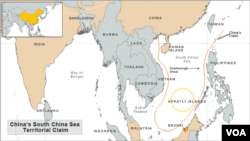MANILA —
The Philippines and China have developed an openly antagonistic relationship over their South China Sea territorial disputes. But while top officials trade accusations, some groups are looking for ways to compromise and jointly drill for oil and gas.
The Philippines' only productive deep-water natural gas project is expected to run dry by 2024.
The country is desperate to develop new oil and gas wells in the resource-rich South China Sea. Philippines Energy Secretary Jericho Petilla said he is hopeful about the potential for an unlikely collaboration between U.K.-based Forum Energy and state-owned China National Offshore Oil Corporation (CNOOC).
"The alternative is not to drill, probably forever... You have to look at the alternatives," he said. "You want to preserve your sovereign rights but at the same time- without actually compromising your sovereign rights, can you come up with commercial [exploration], because we need it."
Both the Philippines and China need the energy locked underneath the seabed, but they cannot agree on how to divvy it up, since each country claims the region as its own.
While that larger issue remains unresolved, energy companies tied to the two nations are trying to find a path forward. Forum Energy is majority-owned by the Philippine-based Philex Petroleum, which has been trying to form a partnership with CNOOC to help it meet a contract to drill two natural gas wells at Reed Bank, just west of the Philippines western-most province, Palawan.
China claims indisputable sovereignty over practically the entire South China Sea, which Beijing says includes Reed Bank. The Philippines, Vietnam, Malaysia, Brunei and Taiwan also claim partial or total stakes in the heavily traversed waters.
Philippines officials say they are hoping to find a way forward by taking some lessons from a deal between Vietnam and China, which have an arrangement to explore waters in the Gulf of Tonkin in the South China Sea, although exactly how they would divvy up the proceeds of a productive well remains unclear.
Yang Fang, a researcher at the Center for Asia and Globalization at Singapore’s National University, says the two nations are relying on clauses in the U.N. Convention on the Law of the Sea (UNCLOS) that allow parties in a dispute to have a provisional arrangement regarding maritime borders. And this provision would be untouched by any final determination of who owns what.
"Vietnam is more pragmatic and also maintains very open and regular communication with China both through the higher official level meeting and also the party to party communication. So that the political will is strong and also they can bring it down to the practical level," said Yang Fang.
Skeptics of the Vietnam / China model, such as Carl Thayer, an expert on South China Sea disputes at the Australia Defense Force Academy, say the agreement gives both parties the appearance of cooperation, while the core disputes remain unresolved.
"China has hyped these agreements and if you look at them very carefully, they only represent very modest steps forward. And they don't yet get into joint development," he said.
Despite optimism from Philippine energy executives about finding a way to strike a deal, President Benigno Aquino has been clear that any partnership between Forum Energy and CNOOC would have to abide by the Philippine position in the dispute.
"We maintain that the area that Forum Energy is exploring is clearly within our EEZ [exclusive economic zone] and therefore, any exploitation of the same has to be in conformity with our laws," he said.
The Philippines says China has encroached on its 370-kilometer exclusive economic zone numerous times and it filed a case in January with the International Tribunal on the Law of the Sea to try to reaffirm its claims. A ruling in that case could come as soon as next year.
The Philippines' only productive deep-water natural gas project is expected to run dry by 2024.
The country is desperate to develop new oil and gas wells in the resource-rich South China Sea. Philippines Energy Secretary Jericho Petilla said he is hopeful about the potential for an unlikely collaboration between U.K.-based Forum Energy and state-owned China National Offshore Oil Corporation (CNOOC).
"The alternative is not to drill, probably forever... You have to look at the alternatives," he said. "You want to preserve your sovereign rights but at the same time- without actually compromising your sovereign rights, can you come up with commercial [exploration], because we need it."
Both the Philippines and China need the energy locked underneath the seabed, but they cannot agree on how to divvy it up, since each country claims the region as its own.
While that larger issue remains unresolved, energy companies tied to the two nations are trying to find a path forward. Forum Energy is majority-owned by the Philippine-based Philex Petroleum, which has been trying to form a partnership with CNOOC to help it meet a contract to drill two natural gas wells at Reed Bank, just west of the Philippines western-most province, Palawan.
China claims indisputable sovereignty over practically the entire South China Sea, which Beijing says includes Reed Bank. The Philippines, Vietnam, Malaysia, Brunei and Taiwan also claim partial or total stakes in the heavily traversed waters.
Philippines officials say they are hoping to find a way forward by taking some lessons from a deal between Vietnam and China, which have an arrangement to explore waters in the Gulf of Tonkin in the South China Sea, although exactly how they would divvy up the proceeds of a productive well remains unclear.
Yang Fang, a researcher at the Center for Asia and Globalization at Singapore’s National University, says the two nations are relying on clauses in the U.N. Convention on the Law of the Sea (UNCLOS) that allow parties in a dispute to have a provisional arrangement regarding maritime borders. And this provision would be untouched by any final determination of who owns what.
"Vietnam is more pragmatic and also maintains very open and regular communication with China both through the higher official level meeting and also the party to party communication. So that the political will is strong and also they can bring it down to the practical level," said Yang Fang.
Skeptics of the Vietnam / China model, such as Carl Thayer, an expert on South China Sea disputes at the Australia Defense Force Academy, say the agreement gives both parties the appearance of cooperation, while the core disputes remain unresolved.
"China has hyped these agreements and if you look at them very carefully, they only represent very modest steps forward. And they don't yet get into joint development," he said.
Despite optimism from Philippine energy executives about finding a way to strike a deal, President Benigno Aquino has been clear that any partnership between Forum Energy and CNOOC would have to abide by the Philippine position in the dispute.
"We maintain that the area that Forum Energy is exploring is clearly within our EEZ [exclusive economic zone] and therefore, any exploitation of the same has to be in conformity with our laws," he said.
The Philippines says China has encroached on its 370-kilometer exclusive economic zone numerous times and it filed a case in January with the International Tribunal on the Law of the Sea to try to reaffirm its claims. A ruling in that case could come as soon as next year.





